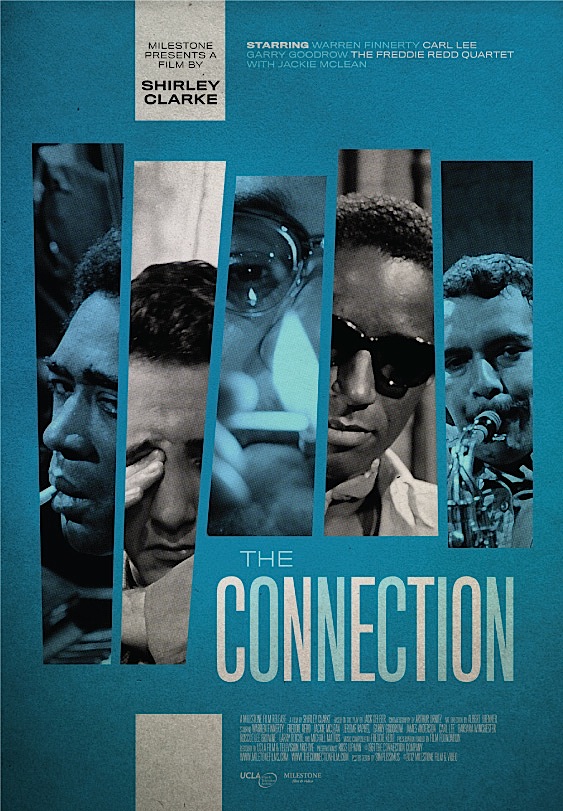

By Ray Pride Pride@moviecitynews.com
Milestone Films Posters Shirley Clarke’s THE CONNECTION
The Connection opens May 4 at the IFC Center. Writes Milestone Films, “Set to the propulsive music of jazz greats Freddie Redd and Jackie McLean (who appear in the film), THE CONNECTION is one of the most vital and fascinating of all American independent films. Created by a woman director working outside the Hollywood tradition, the film fearlessly shattered stereotypes and even questioned the filmmaking process itself. Yet for many years, it was virtually unseen.
“A dynamic member of the postwar independent film movement, Clarke was one of the first filmmakers — and the only woman — to sign the New American Cinema manifesto in 1961. For her debut feature, she decided to take on a controversial off-Broadway play by Jack Gelber. “The Connection” was a complicated and challenging theater piece — a play within a play, within a jazz session. It featured a group of heroin addicts (some of them musicians) waiting around in a grungy New York loft for their drug connection to arrive. Meanwhile, a theatrical producer and writer intent on putting on an “authentic” play, are hanging out with and studying the strung-out junkies. Throughout the play, brilliant Beat dialogue alternated with cool jazz.
“Clarke changed the character of the playwright into a preppy young filmmaker out to make a name for himself by documenting the “scene.” Clarke, who was friends with many of the new cinéma vérité documentarians, added a level of humor by satirizing the earnestness and professed purity of that genre. Keeping the play’s one-set location (re-created in grungy and brilliant detail by future five-time Oscar®-nominated art director Albert Brenner), Clarke set her camera free to swirl, swoop and move to the rhythms of the film’s cool jazz score. When it premiered at the Cannes International Film Festival in 1961, the edgy, exciting and kinetic film was acclaimed a masterpiece.
“Although Clarke had fully embraced the avant-garde nature of Gelber’s play, she was unprepared for the furor her film version would raise. In Hollywood films, addicts were usually “good men gone bad” or crazed “dope fiends.” In contrast, the junkies in THE CONNECTION are vulgar, funny, erudite, talented and unapologetic. They speak about heroin with enthusiasm, and refer to it as “shit.” And it was this four-letter word that helped put the film on the censors’ radar.
“Cinephiles encountering UCLA Film & Television Archive’s sparkling restoration will be astonished by the image and sound quality. Arthur Ornitz’s black-and-white cinematography lushly glows and the great jazz of pianist Redd and saxophone legend McLean grooves, making THE CONNECTION’s rediscovery one of the cinema events of the year!
“THE CONNECTION is the first release in Milestone’s ambitious four-years-in-the-making PROJECT SHIRLEY — to acquire and bring out the films of Shirley Clarke. Although there are more than 100 monographs, books and DVDs devoted to the works of contemporaries like John Cassavetes, Stan Brakhage and Andy Warhol; there is not one entirely dedicated to the life or works of Clarke. Milestone has acquired the rights to four of Clarke’s features and more than a dozen of her short films and will be working with the archives to bring out restored versions over the course of the next year. Next on the list, ORNETTE: MADE IN AMERICA, will be premiering this August at the IFC Center.”















